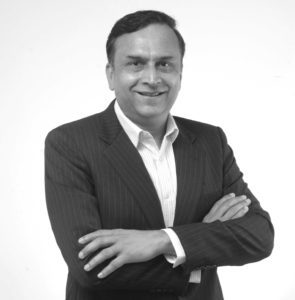We conceptualized The Smart CEO Questionnaire, a series of questions to help our readers understand the thought process of a business leader, areas of passion and the finer nuances of his or her management style. In this conversation with Poornima Kavlekar, Arvind Sankaran gives us a glimpse into the future of financial services and fintech, why the best lessons in his professional journey have been from his failures, and what his number one personal priority is.

A career banker with deep expertise in retail banking and wealth management, Arvind Sankaran has worked for over two decades in the global financial services industry with brands like Citi, Barclays and HSBC.
His last stint in the traditional banking world was at HSBC in Singapore, where he was Head, Premier International – Retail Banking & Wealth Management business covering international markets, including non-resident Indian and non-resident Chinese diaspora.
This was in mid-2014, a critical inflection point in the overall financial services landscape. At the time, Arvind chose to reinvent his own professional journey, to recalibrate work-life balance, while contributing to the financial services industry from a different vantage point.
Today, Arvind is a Venture Partner at Singapore-based VC firm Jungle Ventures. He also serves as Senior Advisor for McKinsey & Company. Arvind enjoys the continuous cross-pollination of ideas and insights between the two professional domains. While advising financial services clients at McKinsey, his deep immersion in the new-age world of fintech is leveraged often, and at Jungle Ventures, his deep operating expertise in the banking industry is a critical enabler.
Arvind graduated as a chemical engineer from BITS Pilani in 1985, and started his working life with “a dream job” in the manufacturing industry as a management trainee at ITC. Post an MBA from IIM Calcutta, which he finished in 1988, he spent a year “foolishly pursuing” a doctoral program in business in the US before deciding to return to India, joining Citibank in Mumbai.
In his first assignment at Citibank (where he joined as a management associate and had a 19-year career) he was part of the founding start-up team for the credit card business in India, and set up what is arguably the first nationwide centralised customer service BPO in Chennai in 1990. When he moved to Citi Singapore, in 1994, his mandate was to drive productivity in the area of credit collections, deploying technologies such as predictive dialers and scoring models, that were new and unproven in Asia. Few years later, as a retail investments product manager, he was given a chance to build a product business from scratch.
Arvind’s career progressed from thereon into the international wealth management space, starting-up the cross border wealth management business within Asia and later on, in Europe. Post the Citi stint, he spent a couple of years, to start up the retail bank for Barclays in Indonesia. “If I connect the dots through my banking career, I have thrived most as an intrapreneur – building startup businesses within a larger organizational framework. It has given me the ability to take risks, explore new horizons and build businesses inside out,” shares Sankaran.
Currently, as a venture partner at Jungle Ventures, he helps the firm identify, evaluate and manage portfolio companies in South East Asia and India that are transforming the future of finance across payments, big data, AI/machine learning, marketplace lending and supply-chain finance domains. And, as an advisor at McKinsey’s Asia Banking Practice Group, he uses his experience in banking, wealth management and financial services, to help institutional clients navigate through the transformation the industry is going through today.
I’ve always found myself comfortable in my own skin and effective as a servant leader. Which is to listen with empathy, communicate complex things with clarity. You have to develop your team to the point where you become dispensable.
When he stepped out of a corporate role in financial services, Arvind admits that the following year was a significant professional and personal transformation for him. During the initial six months, it was a ‘go with the flow’ exploration of a very different domain, a period that Arvind now looks back on and calls a “passion pursuit”. An serendipitous meeting with Vijay Amritraj led him to setup a sports marketing firm (in partnership with Amritraj) with a mission to bring bespoke tennis and golf experiences to Asia. “Perhaps, the timing of this venture was not the best, because the sponsors that we were approaching, like private banks and wealth firms, loved the concept but were financially challenged post-GFC. The commercial revenue model did not pan out, so we decided to shelve the project, maybe to be revisited some day in the future,” says Arvind, with a wink.
By that time, Arvind had already begun spending “time in the market”, immersing himself deep into the nascent fintech industry in Singapore, serving on the advisory boards of several startups. Reflecting upon the experience then, Arvind says that the professional reinvention meant rapidly adapting to the fast-moving landscape around him. Working with smaller teams, unstructured environments and unproven ideas without the backing of an institution was a totally different experience for him.
He is a regular speaker at industry events on fintech and related topics and believes that it is critical to ‘humanise technology” if it is to play a beneficial, transformational role going forward. In this free flowing tete-e-tete with Poornima Kavlekar, he takes a shot at answering the Smart CEO Questionnaire, wherein we capture the thought processes and working styles of senior management leaders across India and Asia.
What are your top priorities today?
My priorities have changed over the last couple of years. I would say, today, I have the perspective and freedom to say my No. 1 priority, all things considered, is my health and my family. Theoretically, it is always supposed to be a priority, but it was always challenged in my career as a banker.
My next priority, in my role at Jungle Ventures is to serve as a true partner to the founders of our portfolio companies and help them build global winners. This apart, I also am continuously evangelising the Jungle Ventures’ brand within the industry and among strategic investors from whom we have raised or aim to raise capital.
My focus now, at this stage of my professional journey is also to help the financial services industry by contributing pro bono time to programs that train future-ready individuals for the industry. If one has to future proof it, then you need professionals who can for example work and interpret data at scale. I’d say that data is going to be the “second “ balance sheet for a financial institution. This means that capacity-building work starting at the high school level – getting kids to take up subjects like data science, help them learn programming languages. As a part of the Singapore’s Indian Business Leaders’ Roundtable forum, I volunteer my time for a government-sponsored initiative called Skills Future, which is focused on building skills for the future. Through this program, I get the priceless opportunity to spend time talking to middle and high school kids to help create awareness on data science career opportunities and help shape their high-school subject options.
So, yes, my top priorities have changed over the years and it is a reflection of my thought process as I build the ‘second innings’ of my career.

Talk to us about a business leader who has influenced you tremendously…
There are a number of business leaders who have influenced me at various points in time. One leader that I’d like to talk about is Piyush Gupta – CEO of DBS Bank Singapore. When I joined as a management associate in Citibank India, he was as a senior manager in Citi India and I had the opportunity of a side-bar conversation with him during a managerial skills development workshop that he led. He went on to achieve tremendous success both within Citi and outside. Over the years, I have gained a lot from our interactions. He is this rare breed of both a visionary CEO and an execution CEO. You usually only find one or the other. He passionately talks about DBS being a 22,000-strong start-up with a firm conviction that if the organisation has to be transformed, it has to be from within the core. He also has the uncommon ability to look over the horizon , conceptualise new business models and in doing so, embrace new technology.
What are some big changes you foresee for the financial services industry.
One of the big permanent changes is the overall regulatory framework, which is seen as a big constraint on what banks can or cannot do, thereby diminishing the industry’s long-term return on equity. Lower return on equity puts a lot of pressure on the banks to find more efficient ways of running their operations.
Over the years, banks have responded to this by offshoring and using new technologies. But it’s going to take a lot more than that. Banks and financial services firms probably need an entire new platform approach and business model that will deliver unit economics that can sustain banking businesses.
It is a given that Fintech players and traditional banks need to collaborate, to chart the industry innovation roadmap. While fintech firms initially thought of themselves as disruptors, they have understood the need to partner as their cost of customer acquisition is prohibitive. This apart, they also don’t have the institutional knowledge and risk expertise gained by banks over many market and risk cycles. Of course, there will be a few players who will be able to scale very rapidly and become large and sustainable on their own and become global leaders and create new categories that redefine financial services.
In your view, how do regulators continue to influence the future of banking?
It could be envisaged that politicians and regulators converge on a similar view sometime in the not too distant future that banks need to go back and serve the purpose for which they were originally instituted, which is to serve the broadest needs of society. And to that extent, banks may be forced to go down that path and become utilities and all the specialized products and services that involve risk taking, are then moved out of the core bank into specialised institutions where the risk capital involved is from private hands and not tax payers money. This is something that can develop over a period of time. This apart, the regulators are also investing in sophisticated technologies like data sciences, machine learning and advanced statistical techniques, to shape the overall industry. This could mean a deeper, on-demand, always-on level of financial sector supervision for the regulator to stay “ahead of the curve” in anticipating and avoiding a major market dislocation.
Tell us about a challenging situation you’ve tackled
I am going back several years; When I moved to Singapore, my immediate challenge as a functional leader was to learn how to manage employees in a new, unfamiliar country with multiple cultures. I had no prior formal training in risk management or collections, but I had an operational background. I was given a mandate to leverage new technologies running into millions of dollars (a huge figure coming out of India then!) to improve productivity. The challenge was that the team, which was about a 100 people, generally distrusted technology and what the management was saying about it. And when there is an internal disconnect, implementing anything is difficult because there is resistance. As a business leader, you are caught between the top-down organizational mandate and your team. That is when I realised that it is important to involve the people who are affected right from day one. It requires some courage to break out of conventional mindsets. During any large scale transformation involving potential job displacements arising from technology, organisational communication is often very limited or obtuse and the management goes into a fortress or siege mentality. It’s important to directly address the fears of your team and actually get them involved.
So, I created a working team, which had 3 or 4 department supervisors, and they spoke to our external technology providers and wrote user requirements. They worked with the internal IT departments to roll out the software and stood up in department meetings to convince their colleagues on why this was a good idea. So, when there is potential distrust or clash between people and technology, you got to respond decisively and with communication, involvement and empowerment of the very people who feel that they are going to be affected.
When there is external dislocation, like the global financial crisis in 2007, the river of plenty just dries up. In the business that I was part of the leadership team then, we were faced with the dire situation of how to motivate the team whose DNA was about selling investment products and wealth creation plans. Beside clear communication, we realised the critical importance of reskilling our people. Bancasssurance products and the associated wealth protection approach did not really exist as a category then. Through a concerted business reskilling effort, our advisors were not only able to future proof themselves, but also actually became the catalyst for the business to recover and turn itself around.
How would you describe your management style
During my journey, I have seen and worked for bosses who have been either a strong-man or a servant leader. I have always instinctively felt that being a strong man does not sit well with me, as it is not who I am. Over the years, seeing leaders come and go, my personal view – and I may be wrong – is that a strong man style can get you ahead for a few quarters but it cannot get you ahead in the long haul. I’ve always found myself comfortable in my own skin and effective as a servant leader. Which is to listen with empathy, communicate complex things with clarity. You have to develop your team to the point where you become dispensable. The day that you can actually remove yourself from the picture and the team still runs effectively or maybe even better, is your true report card.

Quick Take
What did you learn at business school that you still use today?
kadak adhrak chai is the best in a cold rainy day! On a serious note, the value of learning how to develop conceptual frameworks to look at an industry, sector, segment, anything – has been immense.
What have you learnt from things that haven’t gone well?
If you had asked me this when I was much younger, I would have given a different angst-riddeen answer. But with experience and age comes wisdom! I have had my own share of disappointments, what one learns from all that can be described in a single word – resilience.
I hear you are a rockstar. Tell us more…
Music is a key part of my identity. I have been a drummer and vocalist ever since college days. Today, I am part of a rock band, Bandwidth, that I co-created in Singapore along with a bunch of lawyers and bankers over ten years ago. We stage a concert every year, with four hours of thumping Western classic rock and latest Bollywood hits. We are usually in the studios on weekends for 5 to 6 months in a year practicing for the concert. Next concert coming up on September 1st in Singapore! Follow us on https://www.facebook.com/Bandwidthbollywoodrock/
Gut vs data. Which do you lean towards?
I’d like to believe gut, but with a healthy dose of data!
Book that has influenced you: Just for its audacity and unconventionality it is Freakonomics by Steven Levitt.
A person who has influenced you
Outside of my family, Vijay Amritraj. Though our business association was not for long, Vijay left quite an impression on me and I have earned a rare friendship. Firstly, he is a legend and yet remains very humble. He is who you think he is, down to earth, genuine. And with sharp native intelligence and a wit to match! All qualities that I strive to achieve.
What do you see yourself doing in the next five years?
I cant’ see beyond the horizon of the next six months! And if anyone has an answer for your question , I’d say that they are lying! What I do know is that I will make my day tomorrow interesting.
